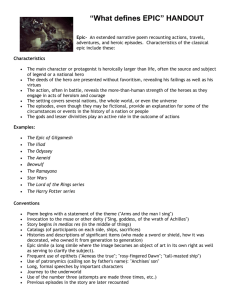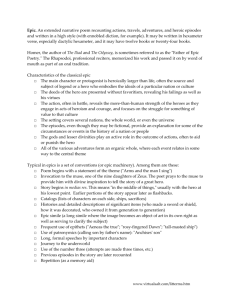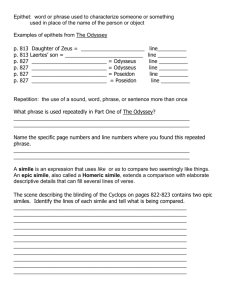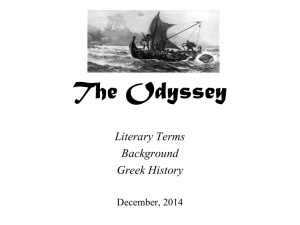Epic Poem
advertisement
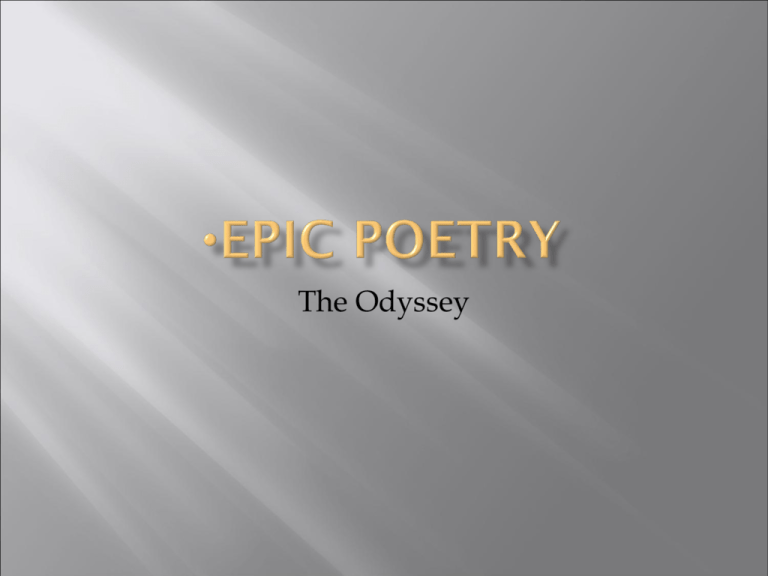
The Odyssey What personal qualities does it take to be a hero in this day and age? Who do you know that you consider to be a hero? Why? An extended narrative poem recounting actions, travels, adventures, and heroic episodes. The main character or protagonist is heroically larger than life, often the source and subject of legend or a national hero The deeds of the hero are presented without favoritism, revealing his failings as well as his virtues The action, often in battle, reveals the morethan-human strength of the heroes as they engage in acts of heroism and courage. The setting covers several nations, the whole world, or even the universe . The episodes, even though they may be fictional, provide an explanation for some of the circumstances or events in the history of a nation or people. The main character is a hero who possesses supernatural abilities. The hero is charged with a quest. The hero is tested to prove his worthiness. The hero is often helped by mythical or magical beings. The hero travels to supernatural worlds. The hero feels defeated and nearly gives up. Resurrection Restitution – regains rightful position. List three characteristics of an epic hero. Create a super-hero using these characteristics. Write a brief news article describing an incident involving your new super-hero. Brief descriptive phrases that help characterize a person or thing. Examples – Odysseus is master mariner or old contender The ocean is wine dark sea Using what you know about epithets create one describing someone you know well. 2. Share your epithet with a friend and see if they can guess who you are describing. 1. A comparison of two unlike things using like or as which goes on at great length and detail. Also called Homeric Simile Three definitions of 'SIMILE': A direct comparison between two things essentially unlike each other, but resembling each other in at least one way, usually using the words 'like' or 'as'. A figure of speech in which an explicit comparison is made between two essentially unlike things, usually using 'like', 'as' or 'than', as in Burns', "O, my luve's like A Red, Red Rose" or Shelley's "As still as a brooding dove," in "The Cloud." A figure of speech that makes an explicit comparison between two things by using words such as 'like', 'as', 'than', 'appears', and 'seems'. The effectiveness of the simile is created by the differences between the two things compared, and it is the job of the simile itself to suggest the important ways in which the two are similar. Find an epic simile on page 936 in which Homer describes the monster Scylla. Create your own epic simile comparing any creature you choose from the Odyssey with something else using highly descriptive language and imagery. Share your epic simile with a partner and see if they can guess which creature you chose. Find an epithet on page 898. Find a metaphor on page 899. Find an epic simile on page 907. Write each example down in your notes. Odysseus has encountered many horrific creatures and dangerous challenges while on his adventure. Which creature or challenge do you believe is most terrifying? Use details to explain your response. Homer’s epic adventure is filled with many lessons for Odysseus. What lessons do you believe may be themes or universal ideas that can be applied across time and culture? How are these themes relevant to you? Choose a character from the list below and write a personal diary entry from his or her perspective considering that character’s role in the story. Polyphemus Circe Antinous Telemachus Calypso Penelope Read the poem “Ithaka” on page 971 in your literature textbook. Write a response including the following: 1. What does Ithaka symbolize? 2. What kind of adventures do you hope to have in your life? 3. What exotic places do you want to visit if any? Read Pages 890 & 891 in your textbook. Find examples in The Odyssey of an epithet and an epic simile. Copy the example in your notes and include the page number and line number where you find it in the text.
